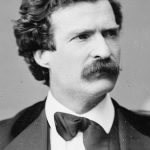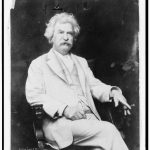From the Archives: Big History and Big Buts
Several years ago, when I was working on a Big Project, I stumbled across the concept of Big History.*
It’s basically the opposite of the academic mantra “not my field.” Proponents of Big History integrate many scholarly disciplines in order to look at human history as a tiny part of the history of the cosmos. One of their favorite ways of illustrating how new we are is to compress the timeline of the universe from 13 billion years to 13 years. In this scenario, homo sapiens would have been around for 53 minutes. The entire recorded history of civilization would have existed for three minutes. “Modern” industrial society has been mucking up the environment for roughly six seconds. In short, we are a blink in the eye of the universe.**
This TED talk by Big History promoter David Christian sums up the basic principles:
[Reminder: if you receive this post by email you may need to go to the History in the Margins website to see the video. Just click the headline or the link.]
It’s fascinating stuff. My introduction to Big History has inspired me to ask slightly different questions than I used to ask. Not just how the salt trade functioned, but why our bodies need salt. Not just when did farming start, but how grain was domesticated. Not just the role of fire in making tools, but the role of fire in making man. But, and for me this is a Big But,*** stories about people are what pulled me into history. Here on the Margins I often focus on the smallest stories. When I think about writing books, I gravitate toward big sweeping themes. But whether the scale of my story is tiny or grand, my subject is people, not great flaming balls in the sky. I’m interested in what happened in that last three minutes, or maybe just a little bit before.
Which means I’m not quite sure what to do with Big History other than admire the intellectual audacity behind it. Any ideas?
*Or more accurately, someone beat me over the head with the idea.
**Or maybe a piece of grit.
***And as my best friend from graduate school will tell you, I love Big Buts. (Sorry, sometimes I can’t resist.)
From the Archives: The First Memorial Day
We're heading into Memorial Day weekend here in the United States: a time to remember soldiers fallen in our country's service. Instead of writing a new post on the subject, I've chosen to share this one again. For the record, My Own True Love and I plan to attend Chicago's Memorial Day parade tomorrow--a first for me but not for the city. Chicago has held a parade each year since 1870. See you there?
My Own True Love and I just got home from a Memorial Day service in Grant Park. It was held at the foot of a statue commemorating General John A.Logan. Before today, Logan on horseback was just another obscure Civil War statue. One I hadn't paid much attention to.
Never again.
Like most Memorial Day services, whether the day is cold and rainy like today or blazing with the first heat of summer, the ceremony was moving. A young Marine captain, veteran of the Iraq war, reminded us that Memorial Day is not Veteran's Day--that the purpose is not to thank the living* but to honor the dead. A woman who left Vietnam as a toddler at the end of the Vietnam War played an achingly beautiful version of Taps. I was not the only person who cried.
We always attend a Memorial Day service if we can. We chose the service in Grant Park by chance. It turns out that celebrating Memorial Day at General Logan's feet is particularly appropriate. Logan was a Civil War general, a congressman and senator from Illinois, and an unsuccessful candidate for Vice-President. In his role as Commander-in-Chief of the Grand Army of the Republic, he was also one of the principal founders of Memorial Day.
On May 5, 1868, Logan issued GAR General Order 11, establishing the first Memorial Day:
I. The 30th day of May, 1868, is designated for the purpose of strewing with flowers or otherwise decorating the graves of comrades who died in defense of their country during the late rebellion, and whose bodies now lie in almost every city, village, and hamlet churchyard in the land. In this observance no form or ceremony is prescribed, but posts and comrades will in their own way arrange such fitting services and testimonials of respect as circumstances may permit.
We are organized, comrades, as our regulations tell us, for the purpose, among other things, "of preserving and strengthening those kind and fraternal feelings which have bound together the soldiers, sailors, and marines who united to suppress the late rebellion." What can aid more to assure this result than by cherishing tenderly the memory of our heroic dead, who made their breasts a barricade between our country and its foe? Their soldier lives were the reveille of freedom to a race in chains, and their death a tattoo of rebellious tyranny in arms. We should guard their graves with sacred vigilance. All that the consecrated wealth and taste of the Nation can add to their adornment and security is but a fitting tribute to the memory of her slain defenders. Let no wanton foot tread rudely on such hallowed grounds. Let pleasant paths invite the coming and going of reverent visitors and found mourners. Let no vandalism of avarice or neglect, no ravages of time, testify to the present or to the coming generations that we have forgotten, as a people, the cost of free and undivided republic.
If other eyes grow dull and other hands slack, and other hearts cold in the solemn trust, ours shall keep it well as long as the light and warmth of life remain in us.
Let us, then, at the time appointed, gather around their sacred remains and garland the passionless mounds above them with choicest flowers of springtime; let us raise above them the dear old flag they saved from dishonor; let us in this solemn presence renew our pledges to aid and assist those whom they have left among us as sacred charges upon the Nation's gratitude,--the soldier's and sailor's widow and orphan.
II. It is the purpose of the Commander-in-Chief to inaugurate this observance with the hope it will be kept up from year to year, while a survivor of the war remains to honor the memory of his departed comrades. He earnestly desires the public press to call attention to this Order, and lend its friendly aid in bringing it to the notice of comrades in all parts of the country in time for simultaneous compliance therewith.
With the exception of the jabs at the Confederacy, I couldn't say it better myself.
Remember the fallen. Thank the living. Pray for peace.
* Though I urge you to thank, or hug, a veteran while you're thinking about it.
Chasing the Last Laugh
I realize that my United States citizenship may be revoked for saying this, but I am not a fan of Mark Twain's work.* I am, however, eternally fascinated by Mark Twain's career, which was a roiling broth of ambition, depression, and innovation. Consequently, I was much happier to read Richard Zacks' newest book, Chasing the Last Laugh: Mark Twain's Raucous and Redemptive Round-the-World Comedy Tour , than to read Twain himself.
- Mark Twain ca. 1871 Who knew the younger Twain was a hottie?
- Mark Twain ca 1907 Looking the way we all picture him
In 1896, Mark Twain was sixty years old, the beloved author of Huck Finn and Tom Sawyer, and the United State's highest paid writer. He was also on the verge of financial disaster, most of which he had brought on himself through a combination of cock-eyed optimism and impatience with details. Determined to keep a larger percentage of the proceeds from the sale of his books, he had founded his own publishing company, which proved to be a cash drain rather than a source of income. He poured money into James Paige's innovative typesetting machine, which was eclipsed by the Merganthaler Linotype in the nineteenth century's version of the technological duel between Beta and VHS--and encouraged others to do the same. He signed documents he didn't understand. He filed for bankruptcy, but continued to be pursued by creditors who refused to believe the luxury-loving author had nothing. Finally, Twain saw only one solution: to go back on the public speaking circuit, which he had happily left twenty-five years before.
In Chasing the Last Laugh, Zacks turns the circumstances that led Twain to undertake a year-long tour of the English-speaking world and the tour itself into a combination of high drama, black comedy, and occasional tragedy. The result is a lively and insightful study of the claims of celebrity, the value of controlling the public narrative, and the mercurial figure of Twain himself.
*Those of you who are sharp-eyed may remember that I also recently expressed my lack of enthusiasm for Ernest Hemingway. In case anyone is getting the impression that I am uniformly "agin" male American authors from the end of the 19th and beginning of the 20th century, I would like to point out that I am a big fan of F. Scott Fitzgerald (the short stories) and Dashiell Hammett. (Choosing two off the top of my head. )
Most of this review previously appeared in Shelf Awareness for Readers.







